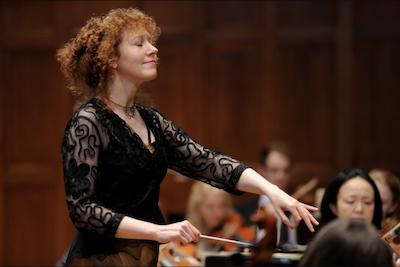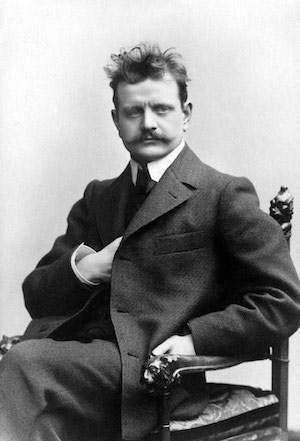by Jarrett Hoffman

•Today: Assembly for the Arts’ 1:00 session on the Arts & Economic Prosperity 6 study, and concerts this evening by Apollo’s Fire, Singers’ Club, The Cleveland Orchestra, and CityMusic
•Interesting read: the effects of music (including improv) on dementia in “the here and now”
•Almanac: the Christmas carols of Jean Sibelius
HAPPENING TODAY:
From 1-2 pm, Assembly for the Arts is hosting a free virtual meeting with Randy Cohen, Vice President of Research at Americans for the Arts. The session will focus on the Arts & Economic Prosperity 6 study, which Assembly is leading in Cuyahoga County in partnership with Americans for the Arts. “Learn why this study is essential for our region’s arts and culture industry and how you or your organization can help,” the Assembly writes. Register here.
There are also four concerts on the docket tonight.
Apollo’s Fire continues its run of Handel’s Messiah tonight at 7:00 pm at St Paul’s Episcopal Church in Akron. Jeannette Sorrell (pictured) conducts, and the featured soloists are sopranos Sonya Headlam and Erica Schuller, mezzo-sopranos Amanda Crider and Kim Leeds, tenor Steven Caldicott Wilson, and baritone Edward Vogel.
Also at 7, the Singers’ Club of Cleveland presents a program titled “Holiday Sweets” at CMA’s Gartner Auditorium, with “holiday cheer” to be served from 5:30-6:45.
The Cleveland Orchestra puts on its own holiday concert at 7:30 pm. Brett Mitchell conducts, with the ensemble also to be joined by soprano Mikaela Bennett, the Cleveland Orchestra Chorus, and members of the Blossom Music Festival Chorus. (Read a preview by Emmy Hensley here.)
And conductor Stefan Willich joins CityMusic Cleveland for a 7:30 program of music by Mozart, Verdi, Puccini, and Johann Baptist Georg Neruda at Temple-Tifereth in Beachwood, with soprano Chabrelle Williams and trumpeter Jack Sutte featured as soloists.
The CityMusic concert is free. Tickets for the other concerts — and all the other details you need — can be found in our Concert Listings.
INTERESTING READ:
BBC shines a spotlight on the effects of music on dementia — not just in terms of memory, but also the connection “to the here and now.” The article centers around the work of Manchester Camerata and principal flute Amina Hussain, who is also a music therapist. One interesting element of the therapy sessions? Improv. “Improvisational music-making is particularly important for people with dementia, especially when it comes to building their confidence and their self-esteem.” Read here.
TODAY’S ALMANAC:

Sibelius — pictured right with an alarming case of bedhead — is most often remembered for works such as Finlandia and the Violin Concerto as well as for his seven symphonies. On that note, he conducted the premiere of his Fifth Symphony (in its original form) on his own 50th birthday, which was celebrated as a national holiday.
Less well-known, but seasonally appropriate, is his set of Christmas carols — the Five Christmas Songs, which he cataloged as his Opus 1 (despite the fact that later opus numbers precede these songs in date).
The carols were part of the Sibelius family’s holiday traditions, and perhaps it is a sign of the personal importance these works held for him that he continued to revise them until a few years before his death — despite the fact that he had largely stopped composing three decades earlier.
The fifth in the set, On hanget korkeat, nietokset (“High are the snowdrifts”), is one of the most beloved — a sentiment that the composer’s children agreed with, for it signaled to them that the holiday festivities were underway. Click here to listen to an arrangement by Erkki Nurminen, as performed by conductor Mikko Sidoroff and the Turku University Choir during an Advent concert in 2013. (And read more about Christmas at the Sibelius household here).
No. 5 is convenient to feature not only because it is one of the most famous from the set, but also because it’s the easiest one to search for with its single Finnish title. So buckle up — the other song that is particularly well-known, No. 4, might be identified five different ways: as Julvisa or Jouluvirsi (Swedish and Finnish for “Christmas carol”), or by its opening line Giv mig ej glans, ej guld, ej prakt in Swedish, En etsi valtaa, loistoa in Finnish, and “Give me no splendour, gold or pomp” in English.
But it’s Finnish Music Day after all, so have a listen here to En etsi valtaa, loistoa, as sung by the splendid Finnish baritone Jorma Hynninen.
Other anniversaries to mark on this date include three more birthdays: Mexican composer Manuel Maria Ponce (1882), Czech composer Bohuslav Martinů (1890), and Irish flutist James Galway (1939).


